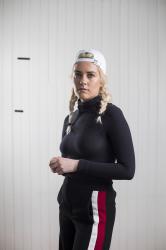While Iceland is known worldwide for being socially progressive, the homogenous country still has some problematic moments, particularly in regards to race. Until very recently, diversity within the country was quite small, with few foreigners and, specifically, very few black people. A 2011 census put the number of individuals of African origin at only 782, though that number doesn’t include black immigrants from other continents.
Iceland, of course, has no outward history of colonialism, but that doesn’t mean the nation was exempt from the influx of racist imagery that colonial imperialism created in the West. In fact, it’s quite the opposite, and racial attitudes towards black people here have been vastly shaped by those of Americans and Europeans.
But while the United States and Europe—due to their diverse populations—have been forced to confront many aspects of their internalised racism head on, Iceland has not had that discussion. These inflammatory attitudes, often hidden beneath the surface of Icelandic society, were brought to light these past two months with two blackface scandals that shook the country.
Earth, Skin & Fire
On a trip to Húsavík, rapper Króli— real name Kristinn Óli Haraldsson— watched local disco tribute band The Hefners perform. Dolled up in large afro wigs with brown paint covering their faces, The Hefners were quite clearly in blackface—the kind so blatant and extreme that it immediately screamed minstrel.
Kristinn calmly confronted the band, telling them how offensive their getup was, but was greeted with arrogance. The group essentially said that they were honouring black music with their outfits and moreover that it was ok to wear blackface because Robert Downey Jr. had done so in ‘Tropic Thunder.’ They noted that because one of the band members was black, it was ok. The musicians then went on to boldly declare that they did not care what people from the south of Iceland would say about them on the internet. Other residents of Húsavík, Kristinn reiterated, responded similarly.
While just a teenager, Kristinn was remarkably sympathetic in his analysis of the situation, describing how he believed the community wasn’t blindly racist but rather just ignorant of how offensive their costumes were. The singer of the band later apologised on Facebook.
Unfortunately though, this defence of blackface—that it comes from an innocent or celebratory rather than malicious place—is anything but an isolated experience in Iceland. In fact, it appeared just a month prior to The Hefners scandal.
No excuse
In early June, an Icelandic summer camp named Ölver posted a picture of one of their campers on Facebook. The girl, wearing a tie-dye t-shirt in the summer sun, was covered head to toe in black paint while donning a large afro wig. The caption underneath read, “First girls group is TOMORROW,” with a number of emojis next to it. “The question is, will this one show up?”
Martiña Williams, a mother in Reykjavík originally from Jamaica, shared the post, declaring that she would not let her daughter attend the camp, which she was supposed to go to in the end of July.
“My skin colour is not a costume,” Martiña said to DV. In the article, she described how, while she understands that Iceland is very isolated, with TV and music nowadays, there is just no excuse for someone to not understand racism. “Some things, you just don’t do or say, even if you don’t know the entire history behind it,” Martiña continued. “There is no excuse for this behaviour and that this is the individual that will greet children on their arrival sends the message that this ‘costume’ is ok. But it is not.”
The article received hundreds of comments, with numerous showing just how uninformed many Icelanders—regardless of demographics—were about blackface. One commenter, Rúnar Jóhannsson, wrote, “Ban every costume. I remember when I dressed up as a baker. I didn’t realise I was humiliating all the bakers in the world, no matter their skin colour. I regret it. I’m sorry to all the bakers.” This received 82 likes, and many others were just as clueless.
The summer camp, which is the official camp of the Icelandic branch of the YMCA, eventually responded with an apology. They said that their employees did not know the costume was racist and that the girl was merely acting as a character in a play. They then called the character “ill-developed.”
The unanswered questions
It’s hard to believe that both the summer camp and the country band created their costumes out of pure maliciousness. But, that said, it’s difficult to imagine that anyone in this day and age would not know that blackface is racist, so it’s hard to excuse their actions by way of ignorance. Did they not care? Did they not know? These are difficult questions.
Innocent roots can often cloak more sinister beliefs, though, and perhaps, it’s best to look at these two occurrences as windows into the nuggets of racism ingrained in the Icelandic psyche. The ones that—in these past two months—chose entertainment over respect.
The Grapevine reached out to Earth, Wind & Fire, the band The Hefners were trying to imitate, but we have not received any response.
Buy subscriptions, t-shirts and more from our shop right here!


















